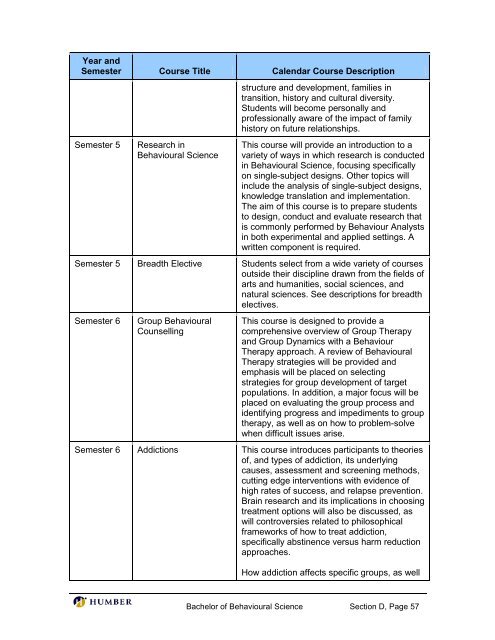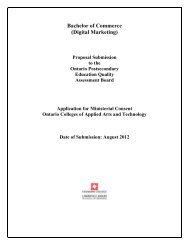Bachelor of Behavioural Science - Postsecondary Education Quality ...
Bachelor of Behavioural Science - Postsecondary Education Quality ...
Bachelor of Behavioural Science - Postsecondary Education Quality ...
You also want an ePaper? Increase the reach of your titles
YUMPU automatically turns print PDFs into web optimized ePapers that Google loves.
Year and<br />
Semester Course Title Calendar Course Description<br />
Semester 5<br />
Research in<br />
<strong>Behavioural</strong> <strong>Science</strong><br />
structure and development, families in<br />
transition, history and cultural diversity.<br />
Students will become personally and<br />
pr<strong>of</strong>essionally aware <strong>of</strong> the impact <strong>of</strong> family<br />
history on future relationships.<br />
This course will provide an introduction to a<br />
variety <strong>of</strong> ways in which research is conducted<br />
in <strong>Behavioural</strong> <strong>Science</strong>, focusing specifically<br />
on single-subject designs. Other topics will<br />
include the analysis <strong>of</strong> single-subject designs,<br />
knowledge translation and implementation.<br />
The aim <strong>of</strong> this course is to prepare students<br />
to design, conduct and evaluate research that<br />
is commonly performed by Behaviour Analysts<br />
in both experimental and applied settings. A<br />
written component is required.<br />
Semester 5 Breadth Elective Students select from a wide variety <strong>of</strong> courses<br />
outside their discipline drawn from the fields <strong>of</strong><br />
arts and humanities, social sciences, and<br />
natural sciences. See descriptions for breadth<br />
electives.<br />
Semester 6<br />
Group <strong>Behavioural</strong><br />
Counselling<br />
This course is designed to provide a<br />
comprehensive overview <strong>of</strong> Group Therapy<br />
and Group Dynamics with a Behaviour<br />
Therapy approach. A review <strong>of</strong> <strong>Behavioural</strong><br />
Therapy strategies will be provided and<br />
emphasis will be placed on selecting<br />
strategies for group development <strong>of</strong> target<br />
populations. In addition, a major focus will be<br />
placed on evaluating the group process and<br />
identifying progress and impediments to group<br />
therapy, as well as on how to problem-solve<br />
when difficult issues arise.<br />
Semester 6 Addictions This course introduces participants to theories<br />
<strong>of</strong>, and types <strong>of</strong> addiction, its underlying<br />
causes, assessment and screening methods,<br />
cutting edge interventions with evidence <strong>of</strong><br />
high rates <strong>of</strong> success, and relapse prevention.<br />
Brain research and its implications in choosing<br />
treatment options will also be discussed, as<br />
will controversies related to philosophical<br />
frameworks <strong>of</strong> how to treat addiction,<br />
specifically abstinence versus harm reduction<br />
approaches.<br />
How addiction affects specific groups, as well<br />
<strong>Bachelor</strong> <strong>of</strong> <strong>Behavioural</strong> <strong>Science</strong> Section D, Page 57
















